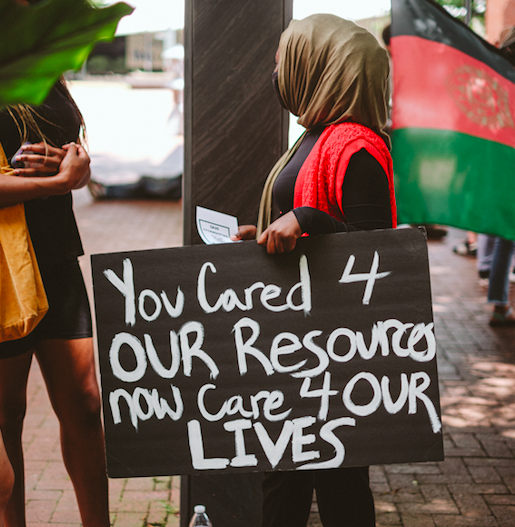Since the Taliban seized control of Afghanistan a few weeks ago, more than 100,000 Afghans have fled the country, fearing for their lives. Many are currently going through strict immigration and security screening in other countries, like Qatar and Bahrain, but thousands who are further along in their applications for Special Immigrant Visas—which allow interpreters, translators, and others who aided U.S. forces to become permanent residents—have been permitted to enter the U.S., and go through processing at military bases across the country.
According to the local International Rescue Committee, a dozen Afghan families have taken refuge in Charlottesville. However, the agency expects to welcome up to 250 Afghan evacuees in the coming weeks.
“Several families had their visas issued already, so they were able to get on the last commercial flights out, walk into our agency, and ask for services,” says Charlottesville IRC Executive Director Harriet Kuhr. “We thought we were going to get a lot like that, but the commercial service got cut off so fast…so a lot of people who would have done that ended up on the early evacuation flights.”
Though the other SIV families who have arrived in Charlottesville were only on a military base for a few days, “the people who are eligible for [SIVs], or maybe started their applications and aren’t very far along, they’re going to be on these bases for several weeks until their processing is completed,” Kuhr says. “There’s been this big empty space in between waiting for the next wave.”
Over the past few weeks, the IRC has received a large amount of in-kind donations from the community, as well as financial support. The agency plans to reach out to community groups soon to find sponsors for individual Afghan families in Charlottesville.
“It’s just so heartwarming to see the people throughout the community reaching out, and how much they want to help,” says Kuhr. “It says a lot about Charlottesville as a welcoming community.”
“We’re trying to figure out what we still need more of,” she adds. “The best place for people to look is at our webpage…We’ll be posting updates on what we do and don’t need.”
International Neighbors, another local refugee resettlement group, has also been active in helping families as they arrive. The group reports that 200 locals have reached out to assist with completing paperwork that will help bring Afghan families across safely. They’re still looking for people to donate money and time to help with the resettlement efforts.
At the University of Virginia, the Afghan Student Association has hosted two rallies on Grounds to raise awareness about the crisis in Afghanistan, and organized social media campaigns to educate people on ways to support refugees. In addition, the group has been working with fellow student group Muslims United to collect donations and provide assistance with translation.
“We’ve been trying to keep in contact with [the families], meet them, and let them know they have people in the community and UVA students they can count on who have access to a lot of resources here,” says fourth-year student Wanna Wardak, president of the ASA.

UVA’s Muslim Students Association has also been supporting ASA’s protests, and providing donations to the Islamic Society of Central Virginia and Muslims United. It plans to soon host its own supply drive for local refugee families, says president Shahira Ali, a fourth-year student.
In addition to providing donations, Kuhr encourages community members to get involved in advocacy work by urging their senators and representatives to support progressive immigration legislation, which may make it easier for immigrants and refugees to come to the U.S., and bring their families with them.
“Picking up the phone and calling your congressman still has power,” Kuhr says.
Wardak and Ali stress the importance of listening to and rallying around Afghan voices at this critical time.
“We always need to be asking refugees directly what they need,” says Ali. “They are the ones who need the support and the aid.”
“We just want people to care,” Wardak says. “People are desensitized to what’s happening in Afghanistan because it’s been 20 years of conflict with the U.S., and 40 years of non-stop war and terror.”
That constant drumbeat of news can obscure the human cost of the conflict, Wardak says. “We have real people, here in Charlottesville, who do need help, and have had no choice in what’s been happening in their lives.”
